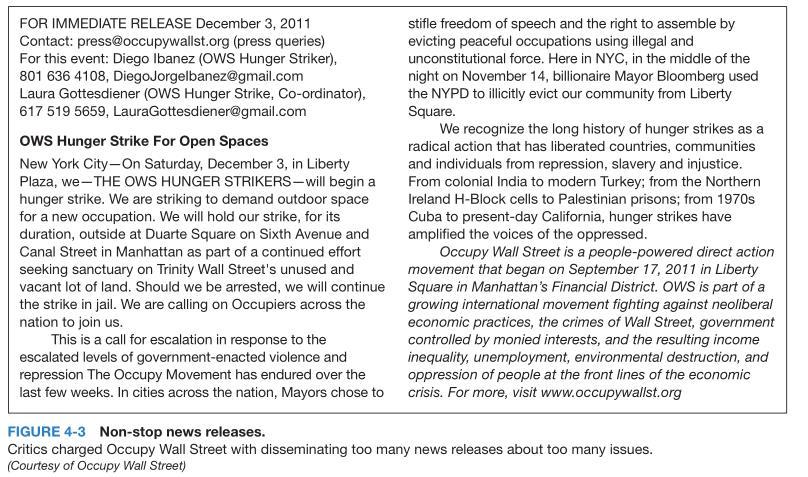Question
Occupy: Si, Changing Public Opinion: Not Exactly Ironically, the movement to protest the inequities of Americas financial system in September 2011 originated in Canada. Occupy
Occupy: Si, Changing Public Opinion: Not Exactly
Ironically, the movement to protest the inequities of America’s financial system in September 2011 originated in Canada. “Occupy Wall Street,” which took over Zuccotti Park in Lower Manhattan, was inspired by the Canadian activist group Adbusters.
The Occupy protest movement was designed to expose social and economic inequality in the United States and elsewhere by exposing greed, corruption, and the undue influence of corporations on everyday life. While the movement attracted copious press coverage and did engrain its slogan, “the other 99 percent,” in the public psyche, from a public relations perspective, Occupy Wall Street’s results were mixed.
One criticism of Occupy was that it flailed out in too many directions, issuing news releases at breakneck speed to attract publicity to stay relevant in the public’s mind (Figure 4-3). The shifting focus of Occupy targets, its detractors argued, tended to dissipate the important messages about inequality that the movement had committed to confront.
Critics also argued that the protestors showed little respect for local residents and merchants, whose daily lives and businesses they interrupted; engaged in criminal activities in their encampment; and practiced questionable hygiene (Figure 4-4).
In terms of changing public opinion, Occupy Wall Street was plagued by having unclear and constantly evolving goals, no unified message, no one leader or spokesperson to crystallize objectives, and appearing to be more con- cerned with publicity than with evoking positive change. Indeed, it was difficult to follow the movement’s targets—one day the banks, the next hedge funds, the next educational institutions.
When the movement began to fizzle in the winter of 2011, the New York Occupy and its derivatives around the nation had spurred as much attention as they had outrage. While the New York Times editorialized, “The Occupy Wall Street protesters had achieved a great deal,” the Wall Street Journal took another view, concluding, “OWS botched an opportunity to capture public opinion and achieve something.”

Questions
1. How successful do you believe Occupy Wall Street was?
2. Had you been running the movement’s public relations initiative, how would you have improved its approach?
Type words, no picture.
FOR IMMEDIATE RELEASE December 3, 2011 Contact: press@occupywallst.org (press queries) For this event: Diego Ibanez (OWS Hunger Striker), 801 636 4108, DiegoJorgelbanez@gmail.com Laura Gottesdiener (OWS Hunger Strike, Co-ordinator), 617 519 5659, LauraGottesdiener@gmail.com OWS Hunger Strike For Open Spaces New York City-On Saturday, December 3, in Liberty Plaza, we-THE OWS HUNGER STRIKERS-will begin a hunger strike. We are striking to demand outdoor space for a new occupation. We will hold our strike, for its duration, outside at Duarte Square on Sixth Avenue and Canal Street in Manhattan as part of a continued effort seeking sanctuary on Trinity Wall Street's unused and vacant lot of land. Should we be arrested, we will continue the strike in jail. We are calling on Occupiers across the nation to join us. This is a call for escalation in response to the escalated levels of government-enacted violence and repression The Occupy Movement has endured over the last few weeks. In cities across the nation, Mayors chose to stifle freedom of speech and the right to assemble by evicting peaceful occupations using illegal and unconstitutional force. Here in NYC, in the middle of the night on November 14, billionaire Mayor Bloomberg used the NYPD to illicitly evict our community from Liberty Square. We recognize the long history of hunger strikes as a radical action that has liberated countries, communities and individuals from repression, slavery and injustice. From colonial India to modern Turkey; from the Northern Ireland H-Block cells to Palestinian prisons; from 1970s Cuba to present-day California, hunger strikes have amplified the voices of the oppressed. Occupy Wall Street is a people-powered direct action movement that began on September 17, 2011 in Liberty Square in Manhattan's Financial District. OWS is part of a growing international movement fighting against neoliberal economic practices, the crimes of Wall Street, government controlled by monied interests, and the resulting income inequality, unemployment, environmental destruction, and oppression of people at the front lines of the economic crisis. For more, visit www.occupywallst.org FIGURE 4-3 Non-stop news releases. Critics charged Occupy Wall Street with disseminating too many news releases about too many issues. (Courtesy of Occupy Wall Street)
Step by Step Solution
There are 3 Steps involved in it
Step: 1
Occupy Wall Street was not a successful as a campaign but only had great press c...
Get Instant Access to Expert-Tailored Solutions
See step-by-step solutions with expert insights and AI powered tools for academic success
Step: 2

Step: 3

Ace Your Homework with AI
Get the answers you need in no time with our AI-driven, step-by-step assistance
Get Started


